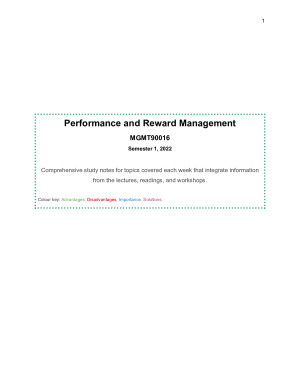Performance and Reward Management (MGMT90016) Comprehensive H1 Summary Notes
Subject notes for UniMelb MGMT90016
Description
Comprehensive study notes for topics covered each week that integrate information from the lectures, readings, and workshops. Included: Textbooks: Managing Employee Performance and Rewards (Shields et al., 2016; Shields et al., 2020). Lecture and seminar content for the 11 weeks. Readings: -Aguinis, H., Joo, H., & Gottfredson, R. K. (2011). Why we hate performance management-And why we should love it. Business Horizons, 54, 503-597 -Rotundo, M., & Sackett, P. R. (2002). The relative importance of task, citzenship and counterproductive performance to global ratings of job performance: a policy capturing approach. Journal of Applied Psychology, 87(1), 66-80. -Grote, D. (2005) Risks and Rewards: Is Forced Ranking Right for My Organization? -Rock, D., & Jones, B. (2015). Why More and More Companies Are Ditching Performance Ratings. Harvard Business Review Digital Articles, 2-4. -Bolino, M. C., Kacmar, K. M., Turnley, W. H., & Gilstrap, J. B. (2008). A Multi-Level Review of Impression Management Motives and Behaviors. Journal of Management, 34(6), . -Sutton, A. W., Baldwin, S. P., Wood, L., & Hoffman, B. J. (2013). A Meta-Analysis of the Relationship Between Rater Liking and Performance Ratings. Human Performance, 26, 409-429. -Cecchi-Dimeglio, P. (2017). How Gender Bias Corrupts Performance Reviews, and What to Do About It. Harvard Business Review Digital Articles, 2-5. -Snyder, K. (2014). The abrasiveness trap: High-achieving men and women are described differently in reviews. to an external site. -Berinato, S. (2018). Negative feedback rarely leads to improvement. Harvard Business Review (1), 32-34. -Gorbatov, S., & Lane, A. (2018). Is HR Missing the Point on Performance Feedback? MITSloan Management Review (4), 65-71. -Finkelstein, S. (2019). Why a One-Size-Fits-All Approach to Employee Development Doesn't Work. Harvard Business Review Digital Articles, 2-4. -Bamberger (2021): Pay Transparency: Conceptualization and Implications for Employees, Employers, and Society as a Whole -Castilla, E. J. (2016). Achieving meritocracy in the workplace. MIT Sloan Management Review, 57(4), 35-41. -Mitra, A., Tehhiala, A., & Shaw, J. D. (2016). Smallest meaningful pay increases: Field test, constructive replication and extension. Human Resource Management, 55(1), 69-72. -Roth, L. M. (2006). Because I'm Worth It? Understanding Inequality in a Performance-Based Pay System. Sociological Inquiry, 76(1), 116-139. -Gerhart, B. & Rynes, S. L. (2003). Compensation: Theory, Evidence and Strategic Implications. Thousand Oaks: Sage Publications, Chapter 3 -Jeffrey and Shaffer (2007). The Motivational Properties of Tangible Incentives, Compensation and Benefits Review, 39, 44-50
UniMelb
Semester 1, 2022
57 pages
14,066 words
$39.00
10
Campus
UniMelb, Parkville
Member since
June 2022
